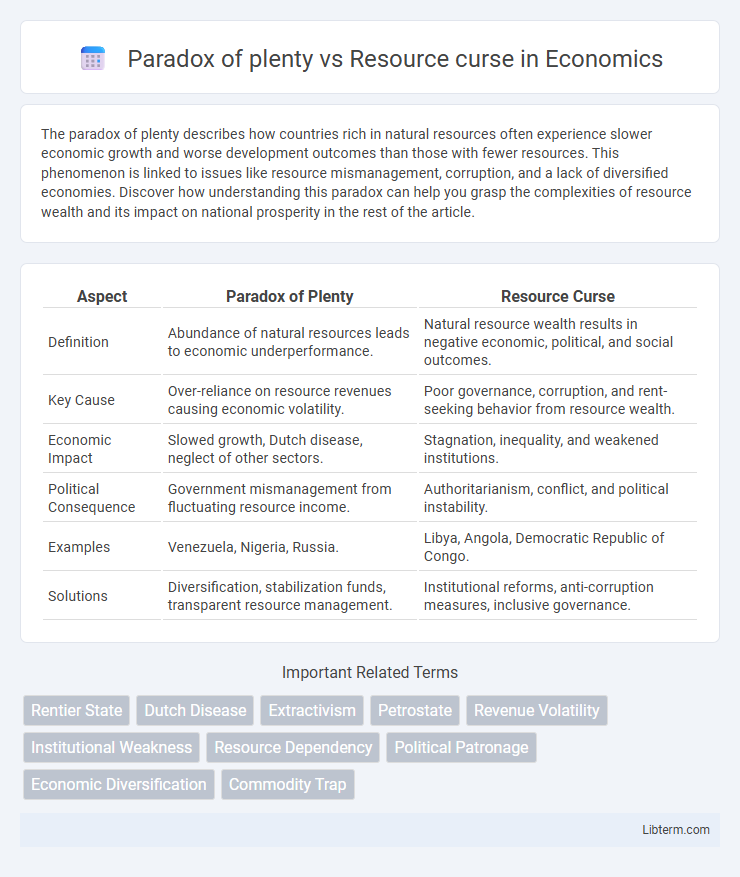The paradox of plenty describes how countries rich in natural resources often experience slower economic growth and worse development outcomes than those with fewer resources. This phenomenon is linked to issues like resource mismanagement, corruption, and a lack of diversified economies. Discover how understanding this paradox can help you grasp the complexities of resource wealth and its impact on national prosperity in the rest of the article.
Table of Comparison
| Aspect | Paradox of Plenty | Resource Curse |
|---|---|---|
| Definition | Abundance of natural resources leads to economic underperformance. | Natural resource wealth results in negative economic, political, and social outcomes. |
| Key Cause | Over-reliance on resource revenues causing economic volatility. | Poor governance, corruption, and rent-seeking behavior from resource wealth. |
| Economic Impact | Slowed growth, Dutch disease, neglect of other sectors. | Stagnation, inequality, and weakened institutions. |
| Political Consequence | Government mismanagement from fluctuating resource income. | Authoritarianism, conflict, and political instability. |
| Examples | Venezuela, Nigeria, Russia. | Libya, Angola, Democratic Republic of Congo. |
| Solutions | Diversification, stabilization funds, transparent resource management. | Institutional reforms, anti-corruption measures, inclusive governance. |
Understanding the Paradox of Plenty
The Paradox of Plenty describes how countries rich in natural resources often experience slower economic growth and weaker development outcomes than resource-poor nations. This phenomenon is closely related to the Resource Curse, where dependence on resource exports leads to economic volatility, governance challenges, and underinvestment in other sectors. Understanding the Paradox of Plenty involves analyzing how resource wealth can distort incentives, fuel corruption, and hinder institutional quality, ultimately stalling sustainable economic progress.
Defining the Resource Curse
The Resource Curse refers to the paradox where countries rich in natural resources often experience slower economic growth, weaker governance, and increased conflict compared to resource-poor nations. This phenomenon stems from factors such as economic volatility, corruption, and neglect of other sectors due to overreliance on resource exports. While closely related, the Paradox of Plenty specifically highlights how resource wealth can undermine political and economic stability, making the Resource Curse a broader concept encompassing these negative outcomes.
Historical Origins and Key Examples
The paradox of plenty and the resource curse both describe economic challenges stemming from abundant natural resources, with origins traced back to historical studies of resource-rich countries experiencing stagnant growth. The resource curse, first identified in the 1950s through cases like Venezuela and Nigeria, highlights how resource dependence can lead to economic instability, corruption, and conflict. The paradox of plenty, often exemplified by oil-rich Middle Eastern nations, expresses the contradiction where countries with vast natural wealth fail to achieve sustainable development and economic diversification.
Economic Impacts: Growth and Decline
The paradox of plenty explains how countries rich in natural resources can experience slower economic growth due to factors like volatile commodity prices and weak institutional frameworks. Resource curse theory highlights how dependence on resource exports often leads to economic decline through rent-seeking behavior, corruption, and underinvestment in other sectors. Both concepts emphasize the challenge of converting resource wealth into sustainable, diversified economic development.
Political Consequences and Governance Challenges
The paradox of plenty and the resource curse both highlight how abundant natural resources can lead to severe political consequences such as corruption, authoritarianism, and weakened democratic institutions. Resource reliance often fosters governance challenges by concentrating wealth in the hands of elites, undermining accountability, and exacerbating social inequalities. These dynamics impede effective policy-making, stymie institutional development, and increase the risk of conflict and political instability.
Social Implications and Inequality
The paradox of plenty and the resource curse both highlight how abundant natural resources can exacerbate social inequalities and deepen divisions within society. Wealth from resources often concentrates in the hands of a few elites, leading to limited social mobility and increased poverty among marginalized groups. These dynamics foster social unrest and weaken institutions that could otherwise manage resource wealth for equitable development.
Natural Resources: Blessing or Burden?
Natural resources often present a paradox of plenty, where abundant wealth from assets like oil and minerals can lead to economic instability and governance challenges rather than prosperity. The resource curse describes how reliance on natural resources can undermine political institutions, reduce investments in other sectors, and increase corruption, turning a potential blessing into a burden. Effective resource management and diversification strategies are crucial to transforming natural resource wealth into sustainable economic growth.
Mechanisms Driving the Resource Curse
The Resource Curse arises from mechanisms such as rent-seeking behavior, where governments over-rely on resource revenues leading to weakened institutions and corruption. Economic volatility caused by fluctuating commodity prices disrupts long-term investment and growth in other sectors, reinforcing dependency on natural resources. The Paradox of Plenty highlights how these mechanisms prevent resource-rich countries from achieving sustainable development despite abundant wealth.
Strategies to Overcome the Paradox of Plenty
Effective strategies to overcome the Paradox of Plenty involve diversifying the economy to reduce reliance on resource exports, enhancing governance and transparency to curb corruption, and investing resource revenues in human capital and infrastructure development. Implementing sovereign wealth funds and stabilizing fiscal policies helps manage volatile resource income, ensuring long-term economic stability. Strengthening institutions and promoting inclusive growth are critical to translating natural resource wealth into sustainable development outcomes.
Lessons for Resource-Rich Nations
Resource-rich nations face governance challenges that can lead to the Paradox of Plenty, where abundant natural resources hinder economic diversification and sustainable development. The Resource Curse illustrates how dependence on resource exports often results in economic volatility, corruption, and conflict, emphasizing the need for transparent institutions and sound fiscal management. Effective resource governance, investment in human capital, and economic diversification strategies are critical lessons for avoiding these pitfalls and ensuring long-term prosperity.
Paradox of plenty Infographic

 libterm.com
libterm.com